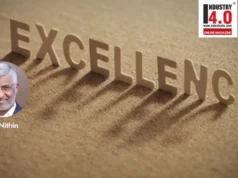Thomas J. Peters is an American writer on business management practices, best known for In Search of Excellence.
EXCELLENCE In 1982, Tom Peters and Robert Waterman’s ‘In Search of Excellence’ was published. The book sold five million copies and Tom Peters was re-invented as the first of a new breed: the management guru. Peters went on to write a string of other books: A Passion for Excellence (with Nancy Austin), Thriving on Chaos, Liberation Management, and The Circle of Innovation. Most recently, he has penned a series of shorter books and booklets (Manifestos2002: The Brawl With No Rules Series), covering his current preoccupations — the arrival of personal branding, the growing role of women in the future of business and the importance of design. In an exclusive interview with us, Peters takes stock of his career, predicts massive changes in the white-collar world of work and explains why he has never been tempted to become a CEO.
In Search of Excellence celebrates its twentieth anniversary this year. Do you think the book stands up to scrutiny 20 years on?
I have no particular interest in whether it stands up. I never think about how In Search of Excellence stands up one way or the other. It was inspiringly useful at the time and I was thrilled to be part of it. It was precisely right for 1982. The book gave me the license. It served its purpose and that’s the best one can hope for. It has holes in it – not quite as big as black holes but nearly!
Have you ever seriously thought of writing a sequel?
I have never thought about revisiting it, though I’ve been asked a hundred times to do so. I don’t want to revisit the past, though history is one of my great passions. Indeed, at the moment I am reading a lot of history. I am fascinated by books on turbulent times and looking at people who deal with ambiguity.
You seem to have moved from a neat engineer’s view of the world to a view that accepts and celebrates the complexity out there. Is that a fair summary?
I’ve moved from the hyper-organized In Search of Excellence with its McKinsey logic to the very scatter-shot A Passion for Excellence to the hyper-organized Thriving on Chaos than the mightily disorganized Liberation Management. Think of an accordion. It tightened up with In Search of Excellence, loosened up somewhat with Thriving on Chaos and then completely loosened with Liberation Management.
Now, I say, beware of the champions of order, the people who offer “rules” for a tidy and righteous living. It doesn’t work that way. Seeing complex issues in black and white is stupid. Life is messy, very messy. In the real world, you have to enjoy the mess. This is particularly true in a downturn. You need to see flux as an opportunity, a chance to launch the bold initiatives you have always meant to launch.
In Search of Excellence was criticised because of the subsequent poor performance of some of the “excellent” companies. Does that sort of criticism affect you?
I am thrilled when the book is misrepresented and criticised. It is a compliment. It has become a landmark, an icon. There’s a great role for critics. They’re there to puncture balloons. Some do so subtly. Others are more heavy-handed. So long as they spell my name right. I would prefer to be criticised for new things, screwing around with new formats. I have just had a productive period writing twelve 50-page booklets, manifestos. I’m very comfortable with bite-size, it is the answer. There is a role for 750-page books on John Quincy Adams or for books like Michael Porter’s The Competitive Advantage of Nations every 20 years or so. But if you want to reach an audience, you have to tailor what you say to the times.
And you have embraced new technology more enthusiastically than most of your competitors
I am always scared of falling behind, and this is the age of constant hype, so you have to find ways to stoke the fire. I don’t know anyone else who does what I do who is up there on the Internet. I still give 80-90 speeches a year and love the fact that I can provide the audiences at my seminars with up-to-date PowerPoint presentations. It gives me great delight to give people who are interested in what I am doing such direct and immediate access.
I just want to talk to people. That’s the joy of the Internet. It gives you access to an unprecedented audience. But now, as everyone’s doing it, you have to pay attention to the packaging. We made mistake after mistake with our Internet business. Subcontracting the website didn’t work – ironic, as I am a champion of subcontracting. Our plans were too grand, too quick and kept falling apart. What I’ve learned is that websites are living entities. It is a playful medium, one where, if you change your mind, you can erase it.
Wouldn’t you see the downturn in the US economy as the end of the new economy?
Everything’s different yet everything the same. The Internet is here to stay and technological change is still accelerating, so it’s the new economy more than ever. This is not the time to hunker down and cut investment in IT and IS. You should invest like a madman in the new stuff.
But you still see more worrying challenges posed by technology?
Yes, things are changing thanks to competition, enterprise Seeing complex issues in black and white is stupid. Life is messy, very messy THOUGHT LEADERSHIP software – the tools that hook up every aspect of a business’ innards, outsourcing, the Internet and B2B commerce, and the compression of time – the speed with which new technologies like the Internet are being adopted. Look back at what happened to blue-collar work. In 1970, it took 108 men about five days to unload a timber ship.
Then along came containerization. The same task now takes eight people one day. That amounts to a 98.5 percent reduction in man days. Think of the same sort of change happening to white-collar work and that’s what’s now underway. The deconstruction of white-collar work. I predict that 90 percent of white-collar jobs in the US will either be destroyed or altered beyond recognition in the next 10 to 15 years. As 90 percent of us are engaged in white-collar work of one sort or another, that’s a pretty catastrophic prediction. But it’s something we all need to think about.
One common criticism of gurus is that they wouldn’t be any good at actually running a business. Do you consider yourself CEO material?
I enjoyed running a 435-person military unit, but I enjoy what I’m doing now. Peter Drucker said he would be bored running a company and the thought of running GE does nothing for me. It was nothing I ever aspired to. Hanging out with CEOs have never been my bag. On the other hand, running a startup, creating a business in a totally different arena, is a ball, whether it’s inventing your own marketing approach or whatever, though it is hard, psychologically demanding work. Being a university dean was a job I thought about. But that’s just fundraising. The one job I want would be to be President of Stanford University, despite the failings associated with universities. I have an enormous respect for research.









